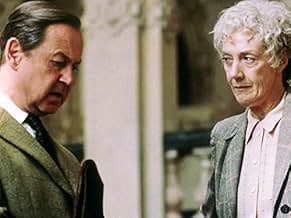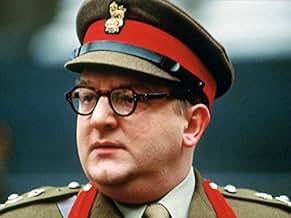VALUTAZIONE IMDb
7,5/10
564
LA TUA VALUTAZIONE
Aggiungi una trama nella tua linguaAnthony Powell's twelve volume novel sequence "A Dance to the Music of Time" has been dramatized for television.Anthony Powell's twelve volume novel sequence "A Dance to the Music of Time" has been dramatized for television.Anthony Powell's twelve volume novel sequence "A Dance to the Music of Time" has been dramatized for television.
- Ha vinto 1 BAFTA Award
- 3 vittorie e 5 candidature totali
Sfoglia gli episodi
Recensioni in evidenza
Though nothing can compare with the books this is quite a fine stab, studded with the finest English talent of its period sensitively cast, and moderately faithful to significant portions of the books. The narrator's voice and perspective are well maintained though oddly James Purefoy is replaced by an excellent but jarring John Standing in the last episode while most of the other actors are cosmetically aged with varying degrees of success. Simon Russell Beale excels but does not dominate as the repulsive Widmerpool and the female characters live as they don't always in the books where they are seen through men's eyes. The music is well chosen and used from Coward's "Twentieth Century Blues" onwards and the use of visual art, including the eponymous Dance is apt.
This was an adaptation that was almost bound to fail. Squeezing 12 novels into eight hours of television allows just 40 minutes per novel. 'The Valley of Bones' was condensed into just 17 minutes. If this had been done well it would truly have been a miracle of compression. However, it was achieved by eliminating about two-thirds of the book.
So it is really rather surprising that the adaptors should have created scenes which were only hinted at rather than described in the book. I counted four, all of which added unnecessary violence and gore. I think if Powell had wanted to make these scenes explicit he would have done so - but he preferred for them to happen offstage.
What is also hard to forgive was the decision to play fast and loose with the chronology towards the end of the series. For example, the launch of 'Fission' should have been immediately after the end of the war rather than somewhere in the mid 50s, while the award of the Magnus Donners prize took place in 1968 or 9 rather than 1963. Anyone who has any feel at all for the period would know that the difference is immense.
But there are good things about this too. The casting is excellent with no-one out of place; the atmosphere for the most part convincing and compelling. A pity that the cast did not have the chance to work through a real adaptation, rather than this drastic and unsatisfactory abridgement.
So it is really rather surprising that the adaptors should have created scenes which were only hinted at rather than described in the book. I counted four, all of which added unnecessary violence and gore. I think if Powell had wanted to make these scenes explicit he would have done so - but he preferred for them to happen offstage.
What is also hard to forgive was the decision to play fast and loose with the chronology towards the end of the series. For example, the launch of 'Fission' should have been immediately after the end of the war rather than somewhere in the mid 50s, while the award of the Magnus Donners prize took place in 1968 or 9 rather than 1963. Anyone who has any feel at all for the period would know that the difference is immense.
But there are good things about this too. The casting is excellent with no-one out of place; the atmosphere for the most part convincing and compelling. A pity that the cast did not have the chance to work through a real adaptation, rather than this drastic and unsatisfactory abridgement.
I have to disagree with Mary Smith from America who said that this series was better than Brideshead Revisited. A Dance to the Music of time is almost completely devoid of any charismatic or otherwise engaging characters, with the exception of the likeable Stringham and the repulsive Widmerpool. It gestures towards Brideshead far too obviously (perhaps this was inevitable given the subject matter and the era) and in a way that only demonstrates its relative inferiority. The dialogue and direction are far too stagey, with the result that the character's words just don't ring true. Moreover I felt no concern for any of the characters: they wander aimlessly through their lives and we are offered nothing more than disconnected snapshots to develop our interest. There seems to be no analysis of or motivation for any of their actions: one character kisses another, some people get married, some divorce and some die. There is little by way of analysis: we "see" a lot, but understand (or care for) little of what goes on.
I confess that I enjoyed this series in parts. The costumes really are very good and the better actors do try valiantly with this stilted and sterile script. But it really is almost embarrassing compared to the infinitely superior Brideshead. Apart from a few entertaining scenes involving people dying at parties, and a rather enthusiastic display of nudity in the early scenes, this mini-series is really only for those who have read the books, and even then only as a curiosity piece.
Perhaps I have come to expect too much of British mini-series after being spoilt by productions such as Brideshead Revisited, Martin Chuzzlewit and Pride and Prejudice. Nonetheless, A Dance to the Music of Time is a barely entertaining, wasted opportunity.
I confess that I enjoyed this series in parts. The costumes really are very good and the better actors do try valiantly with this stilted and sterile script. But it really is almost embarrassing compared to the infinitely superior Brideshead. Apart from a few entertaining scenes involving people dying at parties, and a rather enthusiastic display of nudity in the early scenes, this mini-series is really only for those who have read the books, and even then only as a curiosity piece.
Perhaps I have come to expect too much of British mini-series after being spoilt by productions such as Brideshead Revisited, Martin Chuzzlewit and Pride and Prejudice. Nonetheless, A Dance to the Music of Time is a barely entertaining, wasted opportunity.
They don't make adaptations like this any more - no doubt for cost reasons and a lack of imagination and bravery at the TV companies. 7 hours of solid drama, yet full of incidental humour and some very fine characterisations.
Unfortunately it is flawed, and the flaws make it just very good viewing rather than the excellent series it should have been. The biggest flaws to my mind are:
1 The decision to replace Nick and his wife by new actors for Film 4 was totally wrong. Nick ages far too much in too short a space of time, and looks completely different. This creates a real problem of believability.
2 Still on ageing, some of the actors are 'aged' very well, whilst others (especially the ladies and Odo) seem hardly any different as the decades progress.
3 Film 4 is by far the weakest, though to be fair this reflects the books on which it is based. Perhaps it should have been cut further and the earlier years given even greater prominence.
4 Despite a great deal of pruning, there are still too many characters and insufficient narration for non-aficionados of the books to be sure all the time of who is who.
5 The scenes often seem to be a succession of dramatic deaths - difficult to avoid with the way the story has to be condensed, but very predictable nonetheless.
However, it's still pretty good, and light years removed from much of the dumbed-down drama on TV today.
Unfortunately it is flawed, and the flaws make it just very good viewing rather than the excellent series it should have been. The biggest flaws to my mind are:
1 The decision to replace Nick and his wife by new actors for Film 4 was totally wrong. Nick ages far too much in too short a space of time, and looks completely different. This creates a real problem of believability.
2 Still on ageing, some of the actors are 'aged' very well, whilst others (especially the ladies and Odo) seem hardly any different as the decades progress.
3 Film 4 is by far the weakest, though to be fair this reflects the books on which it is based. Perhaps it should have been cut further and the earlier years given even greater prominence.
4 Despite a great deal of pruning, there are still too many characters and insufficient narration for non-aficionados of the books to be sure all the time of who is who.
5 The scenes often seem to be a succession of dramatic deaths - difficult to avoid with the way the story has to be condensed, but very predictable nonetheless.
However, it's still pretty good, and light years removed from much of the dumbed-down drama on TV today.
It's possibly a bit late to post this question but as I have only now managed to see the video, here goes anyway. Does anyone know WHY it was deemed necessary to replace James Purefoy and Emma Fielding as Nicholas Jenkins and his wife in the last film of the series? Most of the other characters were left to age, convincingly or otherwise, even Widmerpool himself. Though Joanna David did at least bear a tolerable resemblance to how Isobel (Fielding) might have looked in later life, John Standing, excellent actor though he is, didn't look remotely like an aged James Purefoy. The changeover broke the continuum of events for me and was a constant source of irritation. What was behind this strange, irrational decision?
Lo sapevi?
- BlooperIn the final segment, when Widmerpool is kissing the feet of the disciples, the edge of his phony hairpiece is clearly visible on the back of his head.
I più visti
Accedi per valutare e creare un elenco di titoli salvati per ottenere consigli personalizzati
- How many seasons does A Dance to the Music of Time have?Powered by Alexa
Dettagli
- Data di uscita
- Paese di origine
- Lingua
- Celebre anche come
- Una danza para la música del tiempo
- Luoghi delle riprese
- Aziende produttrici
- Vedi altri crediti dell’azienda su IMDbPro
Contribuisci a questa pagina
Suggerisci una modifica o aggiungi i contenuti mancanti































